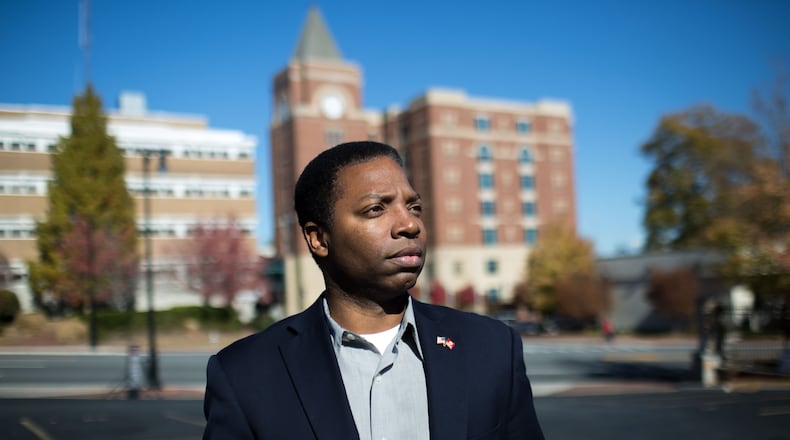A Democratic Party insider launched a primary challenge against U.S. Rep. David Scott on Monday with a pledge to be a more visible progressive voice on income inequality, voting rights and cybersecurity.
Former Cobb County Democratic Party chairman Michael Owens, a Marine Corps veteran who unsuccessfully challenged Scott in 2014, is seeking a rematch against the nine-term congressman in Georgia’s 13th Congressional District.
Owens contends that Scott, 73, has been absent and out of step with his solidly-Democrat southwest Atlanta district, which sweeps from Powder Springs to Stockbridge. He pointed to Scott's residency outside the district – he lives in the neighboring 5th - and his recent support of Republican incumbents, including U.S. Sen. Johnny Isakson, ex-Rep. Mia Love and Cobb County Commission Chairman Mike Boyce.
"Those relationships aren't bringing home the bacon," Owens said in an interview. "What those Republican relationships are doing is making it harder for us to flip seats here in Georgia. It sows discord among those of us who are fighting the most."
A cybersecurity expert for Equifax, Owens said data privacy, cyber and election security would be top priorities for him in Congress. He said he’d also focus on raising the minimum wage, voting rights and advancing economic policies to level the playing field for people of color, women and lower-income families.
Owens said Scott, a member of the House Financial Services Committee, has gotten too cozy with the payday lending industry and other corporate interests. He singled out Scott's vote last year in favor of rolling back portions of the Dodd-Frank financial regulatory overhaul.
“I want to make sure that we stop allowing and supporting policies that are directly attacking our black and brown communities,” the Mableton resident said.
The majority-minority 13th District, which includes portions of Cobb, Douglas, Fulton, Fayette, Clayton and Henry counties, was hard hit by the 2008 recession. Clayton in particular logged some of metro Atlanta's highest foreclosure rates, and parts of the district have struggled to recover.
Scott, a former state legislator, has been easily re-elected since he emerged out of a five-person Democratic primary in 2002.
He's a member of the centrist Blue Dog Coalition and has been critical of his party on certain economic and defense policy issues. Scott voted in favor of the Keystone XL pipeline and opposed the Iran nuclear agreement, but he also rejected President Trump's effort to unwind it and has stood with Democratic leaders on issues like voting rights and food stamps.
A veteran dealmaker, he's constantly angling to broker agreements with the GOP to advance his legislative priorities, especially bills to aid historically black colleges and universities and find job training opportunities for young African-American men.
Even though Scott easily defeated him in the 2014 Democratic primary, Owens contends the political ground has shifted.
Owens has grown his profile in recent years, leading Cobb Democrats during a time of major growth in the aftermath of the 2016 election. (He stepped down in late March to prepare for his run.) He's also made the rounds as a political commentator at Georgia Public Broadcasting and other news outlets.
The center of gravity within the Democratic Party has also swung to the left on the national stage and in Georgia, and Owens is betting that being more aligned with progressives will help him defeat Scott in a high-turnout presidential election year.
Still, Owens faces numerous hurdles.
Scott is well-known for his job fairs and more than 40 years in elected politics, and he started April with nearly $400,000 in his campaign bank account. Owens must also contend with a controversial new Democratic Congressional Campaign Committee policy that will likely make it much harder for him to work with top consultants and campaign vendors.
Owens isn’t the only Democrat eyeing the 13th District seat. Former East Point Mayor Jannquell Peters is also mulling a primary bid.
About the Author
Keep Reading
The Latest
Featured




